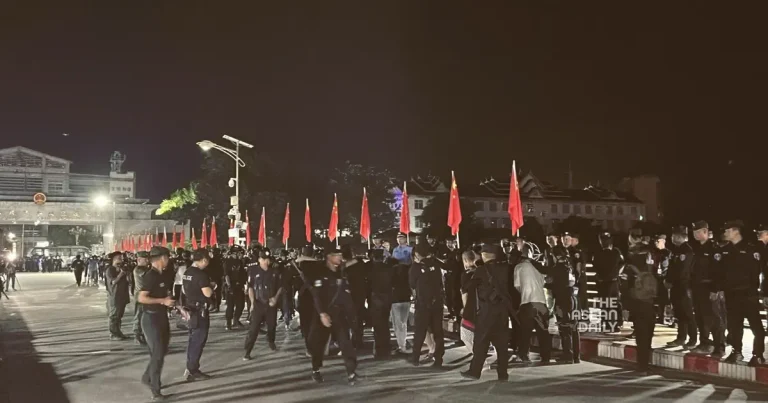10-9-2023 (BANGKOK) Myanmar’s largest and most influential ethnic minority militias, the United Wa State Army (UWSA), has apprehended and sent back more than 1,200 Chinese nationals allegedly engaged in criminal online scam activities. An official from the militia confirmed the arrests on Saturday (Sep 9).
The arrests were conducted within the territory controlled by the UWSA in eastern Shan state. Raids took place on Tuesday and Wednesday, resulting in the detention of the individuals involved. Nyi Rang, a liaison officer from the militia, conveyed this information to The Associated Press via a text message.
The arrested individuals were handed over to Chinese authorities at the border gate located in Panghsang, also known as Pangkham City. This city serves as the capital of the Wa-administered territory situated on the border with China’s Yunnan province.
Cybercrime scams have become a pressing concern in Asia, as many of the individuals employed to carry out such online scams are themselves victims of criminal organizations. These groups entice them with false job offers and subsequently subject them to virtual slavery.
The Office of the UN High Commissioner for Human Rights recently published a report stating that these criminal networks have coerced hundreds of thousands of people in Southeast Asia into participating in scam operations, including false romantic schemes, fraudulent investment proposals, and illegal gambling activities.
The report revealed that around 120,000 people in conflict-ridden Myanmar and approximately 100,000 individuals in Cambodia may be trapped in circumstances where they are compelled to carry out online scams.
According to the report, the centers for online scams in Myanmar are allegedly located in towns along the Thai border in southeastern Kayin state, the Kokang Self-Administered Zone, and the city of Mong La in Shan state, which borders China. Nyi Rang, the Wa liaison officer, emphasized that such online fraud operations are forbidden within the territory administered by the UWSA and its political arm, the United Wa State Party. Previous arrests have also been made in this regard.
WSTV, the UWSA’s online media outlet, confirmed on its Facebook account last Friday that a total of 1,207 Chinese nationals involved in online fraud had been arrested by the Wa state police and subsequently handed over to the Chinese authorities.
China’s state-run Xinhua news agency, citing the Ministry of Public Security in Beijing, reported the same figure for those handed over on Wednesday. The report also mentioned that among the detainees were 41 fugitives from justice.
The United Wa State Army, with approximately 30,000 well-equipped soldiers and advanced weaponry including heavy artillery and helicopters, is the largest and most formidable ethnic armed organization among Myanmar’s major minority groups. It maintains close relations with China, which has provided significant support.
The Wa administer their territory in two separate enclaves in the northeastern and southern parts of Shan state, with one bordering China and the other Thailand. China also maintains a positive relationship with Myanmar’s military rulers, who seized power after the ousting of the elected government led by Aung San Suu Kyi in February 2021.
In July, Chinese Ambassador Chen Hai urged Myanmar’s Foreign Affairs Minister Than Swe, during a meeting in the capital Naypyitaw, to collaborate with neighboring countries to suppress and eradicate online gambling and scam centers operating in Myanmar’s border areas and to rescue Chinese citizens who have fallen into these traps.
Chen Hai visited Naypyitaw at least three times between June and August to discuss border security matters between China and Myanmar.
The UN report on Southeast Asian cybercrime also highlighted the presence of online fraud groups in southeastern Kayin state, which shares a border with Thailand.
Shwe Kokko, a small town in the northern part of Kayin state’s Myawaddy township, has gained notoriety for hosting casino complexes allegedly involved in major organized crime activities, including online scams, gambling, and human trafficking. These complexes were developed by Chinese investors in collaboration with local Border Guard Forces, which are militias affiliated with Myanmar’s army.




